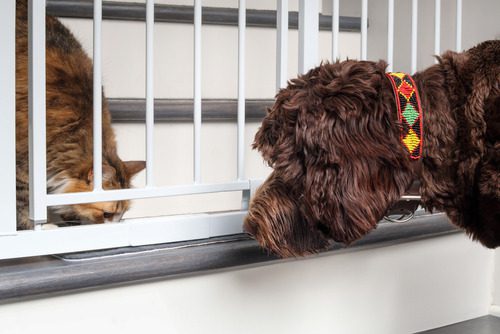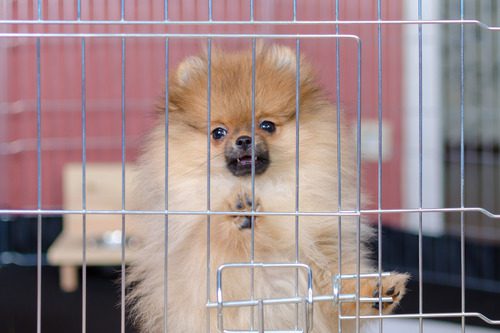Dog Dental Disease: What to Look For and How to Treat It
 Dog dental disease is an umbrella term for multiple diseases and problems with a dog’s teeth. Many diseases can affect a dog’s mouth and can cause severe health problems. It is good to know basic information that pertains to dog dental diseases and how to treat them.
Dog dental disease is an umbrella term for multiple diseases and problems with a dog’s teeth. Many diseases can affect a dog’s mouth and can cause severe health problems. It is good to know basic information that pertains to dog dental diseases and how to treat them.
When it comes to dog dental disease, look for chipped or missing teeth, bloody or discolored gums, and foul breath. Treatment for dog dental disease often includes pet dental work such as tooth extracting and dental surgery. Antibiotics, prescribed by the veterinarian, can be used to treat infections as well.
If your dog is exhibiting these symptoms, be sure to see a vet. Teeth and the gums are directly connected to the blood system, meaning that infections can rapidly spread and cause severe damage.
Common Dog Dental Diseases
Listed below are common dog dental diseases to consider and how to prevent them.
Periodontal disease
The most common disease in dogs is periodontal disease. According to experts, about 80% of senior dogs suffer from this dental disease. When a dog has this disease, they suffer from inflammation surrounding the tooth. The inflammation specifically affects the dog’s tissue and the gums, which can bleed as a result of the infection.
When the gums are infected by a disease, they turn different colors such as blue, black, brown, and purple. It almost appears like a bruise but is decay inside of your dog’s mouth. The condition is painful and can make it hard for your dog to eat comfortably.
Since the gums and tissue are decaying, there is also a strong and foul odor that emits from the area. The worst part about this type of infection is that it can spread fast and damages the jaw bone.
Fractured Teeth
While a fractured tooth is not a disease, it is a huge dog dental problem that vets try to avoid. There are many ways your dog can fracture, chip, or break its teeth.
Usually, if a dog is starving and malnourished, they do not have enough vitamins or calcium to strengthen its bones, including the teeth. When this happens, the teeth are frail and act like baby teeth, breaking with even the slightest pressure.
If your dog eats well and does not have nutrition problems, they can also fracture or break their teeth by biting into something hard. If your dog gets into a tough fight, the tooth can also break or chip in an awkward angle.
When there is a fractured tooth, usually there is an open wound that is free from all bacterial infections. Broken teeth can also make it a lot harder to eat since there is no symmetry. Your dog can continue to break their tooth if it is not repaired.
Plaque Buildup
Another common dental problem is plaque buildup. This common dental disease is normal, but when it develops too much, it can cause severe issues.
Plaque is just bacteria that continue to thrive and build on your dog’s teeth. There are naturally thousands of bacteria in your dog’s mouth which help break down foods for digestion. But, when these bacteria thrive and continue to develop too much, this causes layers of thick plaque or tartar to form on the teeth.
This condition does not spring overnight. Instead, it takes years for the problem to worsen where it needs medical attention. When your dog’s teeth have too much plaque, you will notice a foul odor coming from their mouth that can make it hard to be around your loving puppy.
How to Prevent Dog Dental Diseases
 Some dogs are genetically prone to dental diseases. However, even if there is a genetic component, there are ways you can help your dog decrease the potential for dog dental diseases. Just like humans, when you brush your dog’s teeth, this takes care of bacteria and plaque that results in dental diseases and trouble eating.
Some dogs are genetically prone to dental diseases. However, even if there is a genetic component, there are ways you can help your dog decrease the potential for dog dental diseases. Just like humans, when you brush your dog’s teeth, this takes care of bacteria and plaque that results in dental diseases and trouble eating.
Try your best to brush your dog’s teeth daily with a special dog toothbrush. Ask your vet for recommendations since there are so many treats that help with plaque and odor development; however, not all dogs like the flavor or the textures of these delicious treats.
Take your dog to their vet for yearly dental cleaning. To prevent further damage from dental diseases, continue checking on your dog’s teeth frequently and document any changes.
Conclusion
To conclude, dog dental diseases are not always possible to prevent, but brushing your dog’s teeth daily and seeing a dental veterinarian annually is the best method for prevention.
Do not use a human toothbrush as the bristles are different and not tough enough to clean plaque or tartar buildup. Since our dogs cannot brush their teeth, it is up to us as responsible dog owners to take care of them.
Do you have any further questions about dog dental diseases and how to treat them? For pups in the Terre Haute, Indiana region, Brown Veterinary Hospital offers pet dental care. Call us at 812-645-0715 or book an appointment today!
Recent Posts
About Brown Veterinary Hospital
We are here to serve as your partner in keeping your four-legged family member healthy, ensuring you have all the tools you need to provide them with a lifetime of outstanding care. Our animal hospital in Terre Haute offers a full range of services to nurture and extend your pet’s life, from wellness and preventative care to critical care, exotic pet care, and dermatology.





